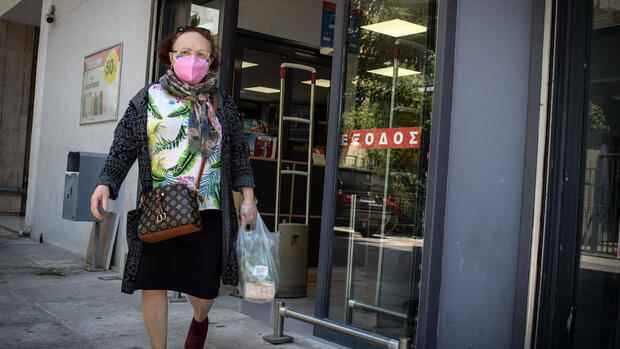Athens, Paris, Madrid In many southern European countries, governments are taking unusual measures to limit the high cost increases in food. Fixed price caps for staple foods are no longer taboo.
However, politicians are mainly relying on the help of the large supermarket chains and are appealing to them to voluntarily keep prices low. This is only partially successful.
In Greece, for example, the conservative government of Prime Minister Kyriakos Mitsotakis is trying to curb inflation ahead of the spring elections. For the month of September, the Greek State Statistics Office reported an increase in consumer prices of twelve percent. Natural gas, heating oil and electricity in particular are driving inflation.
But even for some staple foods, the price increases are well above the average inflation rate, such as dairy products at 23 percent. Bread and meat rose in price by around 18 percent.
Economics Minister Georgiadis is now not relying on state intervention such as price controls, but on price discipline from industry and trade. Last week, Georgiadis discussed a plan to combat inflation with the heads of the four largest Greek supermarket chains and the heads of the wholesale and retail trade associations.
Greece: “We definitely don’t want to interfere in the competition”
By the end of October, the supermarket chains want to present shopping baskets with 50 items from 20 product categories, which they offer at particularly low prices. This includes basic foodstuffs and everyday necessities. The supermarkets are free to choose which products to put in their shopping cart and how they set their prices. “We definitely don’t want to intervene in free competition,” says Economics Minister Georgiadis.
>> Read about this: Greece reduces gas consumption by 40 percent
With an app newly developed by the Ministry of Economic Affairs, citizens should be able to compare the range of products and the current prices in supermarket baskets on their smartphones before going shopping. The Economics Minister expects more price transparency from this.
The fight against inflation is “a difficult exercise,” admits the minister. “Our inflation is imported, more than three quarters of price increases are due to higher energy costs,” says Georgiadis.
For Prime Minister Mitsotakis, inflation is a particular political challenge given that parliamentary elections will be held next spring. And: The poverty rate in Greece is increasing. According to surveys by the statistical office, almost a third of the population is acutely at risk of poverty. This means that Greece has the second highest poverty rate in the EU after Bulgaria.
Spain’s energy minister fails with price caps
Other EU countries are also trying to cushion the consequences of inflation for consumers. In Spain, Labor Minister Yolanda Díaz proposed in early September that major supermarket chains should cap prices on basic groceries. The chains had high enough profit margins to afford such a move, Díaz argued.
She therefore met with the bosses of several supermarket chains. The French Carrefour then offered a selection of 30 basic foods for 30 euros in an effective advertising manner.
In the rest of the industry, however, Díaz received heavy criticism with her proposal. The proposal was not compatible with the free market economy, it said.
>> Read also: Why the Iberian gas price cap is not a model for everyone
The Spanish Competition Commission pointed out to Díaz that any collusion between market participants to set maximum prices for certain foods is prohibited by law.
Spanish supermarkets took up the demand for a price cap in an effective way – or criticized it.
(Photo: Reuters)
Díaz also received criticism from his own center-left government, including from Agriculture Minister Luis Planas, who is responsible for the issue. He made it clear that he would not support the proposal and that each supermarket was free to set its prices. The proposal for a food price cap has now disappeared from the political debate in Spain.
Croatia caps prices
Croatia, which will join the euro zone in 2023, adopted a package of measures against inflation in early September. This includes capping energy and food prices. The price reductions for staple foods such as sunflower oil, milk, flour, sugar and certain meats account for an average of 30 percent.
The package costs the state the equivalent of 2.8 billion euros. The costs are partly covered by a special tax on crisis profits.
France is taking a different approach. A grocery check for the needy was introduced in the Purchasing Power Act in July. Since mid-September, almost eleven million French people, especially those who already receive social security or other support, have received a check for 100 euros per household. There is an additional 50 euros for each child. The money is transferred directly from the state to the bank accounts.
Several million people in France receive a food check from the state.
(Photo: Reuters)
Greens and leftists in the French parliament made an alternative proposal when discussing the purchasing power law. They proposed a “social emergency” law and called, among other things, for a cap on the price of basic foodstuffs, petrol or energy. The proposal was already included in left-wing politician Jean-Luc Mélenchon’s program for the parliamentary elections in June.
However, critics argued that farmers in particular could suffer from the food price cap. In addition, everyone benefited from the low prices, not just the low earners, emphasized the management consultancy Asterès and recommended support specifically for needy French people – this now comes with the grocery check.
More: Inflation in the euro area rises to a new record – three countries over 22 percent
